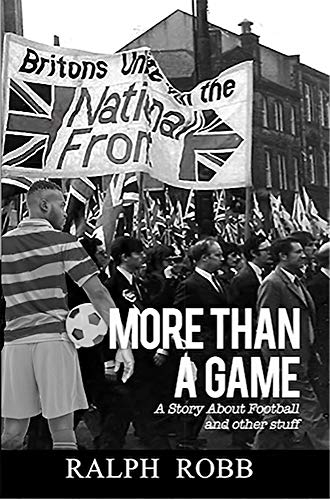Book Review: More Than a Game – A Story About Football and other stuff by Ralph Robb

Wednesday, 29th November 1978. A date that won’t mean a great deal to many people, but in football terms in England, it was hugely significant. It saw Viv Anderson, then at Nottingham Forest, become the first black player to represent England in a full International.
Nowadays stars such as Raheem Sterling, Marcus Rashford, Jadon Sancho and Trent Alexander-Arnold pulling on the white shirt for the Three Lions just isn’t a story here. However, in their last outing in Bulgaria, all the talk was not of the professional job the English team did in demolishing their hosts 6-0, but the disgraceful and unacceptable abuse that the black players had to ensure from the Bulgarian crowd.
Unquestionably, things have improved significantly in England in the forty years since Viv Anderson made his debut, but as the recent incident in the FA Cup showed, when the Haringey Borough v Yeovil Town tie was abandoned due to racist comments from the crowd, the issue has not gone away. Therefore, Ralph Robb’s novel, More Than a Game: A Story About Football and other stuff, is a timely reminder of what life was like during the turbulent early part of the 1980s in England and the racism that was prevalent both in society and in football.
Set in the early ‘80s in Wolverhampton after Aston Villa had won the English First Division title, the story centres on Sabina Park Rangers an amateur team of black players who are the first to reach the final of the Watney’s Challenge Cup. Their coach Horace McIntosh has more selection problems than most, with Villa, the First Division champions wanting to sign one of his best players, and right up until the day of the match, uncertainty about whether he will have a team for the biggest game in the club’s history, set against a background of arrests, a scam and an atmosphere of impending violence on the streets.
Whilst football is at the centre of the story, the build up to the final provides various plotlines that give a vivid and portrayal of life in Britain under Margaret Thatcher and the Tories. Therefore, the tension between the police and black youths feature in the book, reflecting the actual riots that took place in the early ‘80s in places such as Birmingham (Handsworth), Bristol (St Pauls), Leeds (Chapeltown), Liverpool (Toxteth) and London (Brixton) is featured.
In doing so, Robb captures the frustration of the black community who had to deal with a police force not wholly upholding the law in the way it was intended. Interestingly though, the reader is able to see that the older generation of the black community (those arriving into Britain in the 1950s), struggling to maintain a position where they are trusted by the younger age-group, who want action, rather than the placatory words and deeds of characters such as the Sabina Park Rangers coach, Horace McIntosh.
Whilst racism is often simplistically seen as a ‘whites against blacks’, the author illustrates through the novel, that it goes beyond these boundaries, with some characters distrustful of those of Asian descent and furthermore touches on the whole issue of sexuality as Robb through his characters, explores views of the time about homosexuality and the roles of women. Indeed, the characters are drawn to reflect communities as a whole and show everything from the devoted church-goer to the dodgy mechanic.
However, for all the serious nature of the book, there is also some wonderful humour, with the barber’s room of Horace McIntosh providing scenes reminiscent of the classic Channel 4 comedy Desmond’s. Linguistically, there is an air of authenticity as the Jamaican dialogue rockets back and forwards between characters, and again provides some memorable exchanges.
The result of the Final? Well, I’ll let you find out for yourselves.